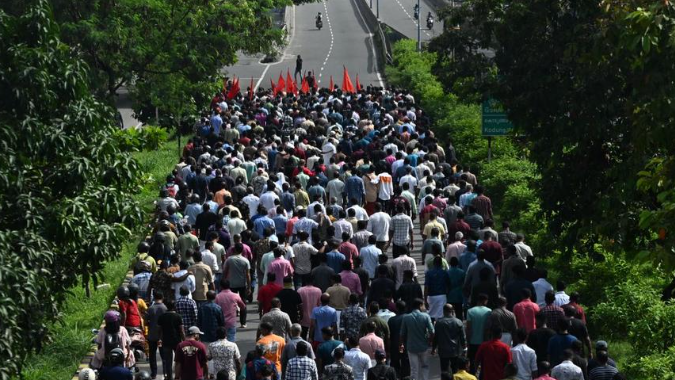

New Delhi: Bharat Bandh 2025 brought significant disruption to public life across India on Wednesday, July 9, as ten central trade unions (CTUs) called for a nationwide strike to protest against the Centre’s labour and economic policies.
The strike saw widespread participation in states like Kerala, where it assumed the magnitude of a complete bandh. Public and private stage carriages, long-distance buses, and local transport services came to a near halt, leaving hundreds of passengers—including families with children—stranded at railway stations and airports. Streets were largely deserted, with minimal vehicular movement and shuttered shops in several districts.
The unions are demanding changes through a 17-point charter, which criticizes the erosion of worker rights and the weakening of tripartite forums meant to protect labour interests. The protesting unions argue that the government has consistently bypassed dialogue mechanisms with workers’ representatives, pushing through unilateral policy decisions.
On the eve of the bandh, the Union Labour Ministry stated that 213 trade unions, including the Bharatiya Mazdoor Sangh (BMS)—affiliated with the RSS—have opted out of the strike. Despite this, the strike gathered momentum, especially in southern and eastern parts of the country.
Adding weight to the protest, a major bank employees’ association announced on Monday, July 7, that banking sector workers would participate in the strike. Some public sector bank branches reported lower staffing levels and partial service disruption.
In contrast, metro services in some metro cities continued to function, and essential services like hospitals, emergency healthcare, and milk supply were mostly unaffected, though minor delays were reported due to transport slowdowns.
The CTUs declared that the strike was not just a protest but a call for the government to re-engage in democratic and inclusive labour policymaking. “This isn’t a political bandh—it’s a worker’s cry against policies that ignore the backbone of this country,” one union leader said during a rally in Kochi.
The impact of Bharat Bandh is likely to spur further debate in Parliament and among state governments, especially as India approaches a crucial policy season ahead of the fiscal year planning.